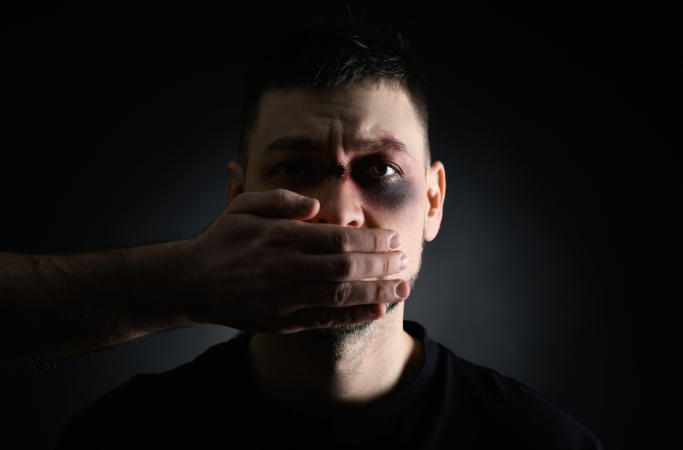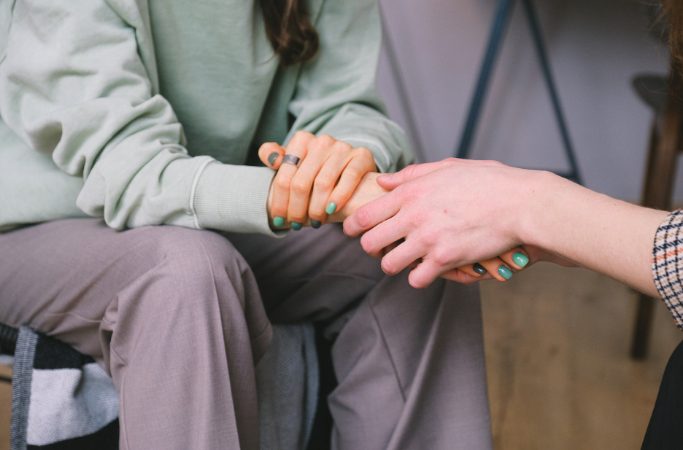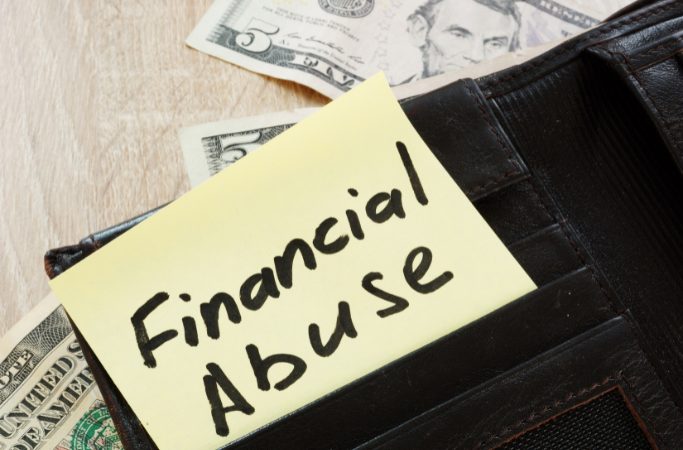Signs of an Abusive Relationship
By Peter Vanderbuild
January 10, 2024 • Fact checked by Dumb Little Man

When we speak of abuse, it's often easy to envision just the physical scars. However, abuse exists in multiple dimensions, encompassing emotional, physical, and sexual realms. The fabric of an abusive relationship is woven with threads of control, fear, and manipulation. Domestic violence, a term frequently associated with abuse, is just one of the many manifestations.
A deeper understanding of the spectrum of abusive behavior is crucial, as it goes beyond mere physical violence. Knowing the signs of an abusive relationship can be the first step towards ensuring personal well-being and safety. Recognizing these signs empowers individuals to take action, either for themselves or for loved ones they suspect might be in harm's way.
Emotional Abuse

Emotional torment often lurks in the shadows, less conspicuous than its physical counterpart but equally devastating. Emotional abuse is a manipulative tool used by an abusive person to gain control and power over their partner. Unlike physical injuries, the scars from emotional maltreatment are internal, manifesting as feelings of worthlessness, confusion, or overwhelming fear.
It's not just about shouting or name-calling. Subtle tactics, like belittling, constant criticism, and gaslighting, can make victims feel guilty or confused about their reality. Over time, this erodes self-worth and can lead to severe mental health implications. The isolating nature of emotional abuse means that victims often withdraw from family members and friends, increasing their vulnerability.
An abusive person may dictate who the victim can converse with, monitor phone calls, or exploit insecurities to maintain dominance. The behavior is designed to create dependency. The victim may come to believe they are the only person at fault in the relationship, making it difficult for them to seek help or escape the abusive situation.
>> Also Read: How to Overcome Emotional Abuse
Physical Violence

Physical violence, a horrifying component of many abusive relationships, isn't always marked by evident wounds or broken bones. It often begins subtly, escalating from a seemingly harmless push to more severe and frequent incidents of physical force. The manifestations of this abuse can range from slapping, choking, or even using weapons.
Beyond overt acts of violence, intimidation plays a significant role. Abusers often employ threats or displays of physical power to instill fear and assert dominance. The mere act of raising a hand or blocking a doorway can evoke immense fear without a single touch.
Victims, fearing judgment or further retaliation, might hide signs of their injuries, using makeup or clothing to cover bruises. Moreover, the emotional toll of physical abuse leads many victims to internalize blame, feeling they somehow provoked or deserved the violence. This cycle of blame and violence can trap the victim in a perpetual state of fear and helplessness.
Friends and family play a pivotal role here. Observing frequent injuries, changes in behavior, or the victim becoming increasingly isolated can be warning signs of ongoing physical violence. Bringing these concerns to light and offering support can be a first step in breaking the cycle of abuse.
Sexual Abuse
Sexual abuse is a harrowing intrusion that can shatter one's sense of self-worth and safety. In the context of intimate relationships, it is a grievous betrayal of trust. Sexual abuse isn't just about forced sexual activities; it encompasses a range of violations, from unwanted touching to sexual assault and rape.
Consent is pivotal in any intimate act. An abusive partner may disregard their partner's boundaries, coerce them into sexual acts, or use sexual violence as a means of control and dominance. These actions are not about passion; they're about power.
A particularly insidious form of sexual abuse is reproductive coercion, where one partner sabotages birth control methods or forces pregnancy against the other's wishes. Such violations deeply affect a person's autonomy over their own body.
The psychological impact of sexual abuse is profound. Victims may grapple with feelings of shame, guilt, and anger. They may feel isolated, fearing disbelief or judgment if they disclose the abuse. Their mental health can deteriorate, leading to anxiety, depression, or post-traumatic stress.
It's vital for victims to know they're not alone. Support from family members, friends, or professionals can offer a lifeline. Online therapy and counseling with a licensed therapist are avenues to begin healing. Above all, it's crucial to remember that the blame lies squarely with the abusive partner, never with the victim.
Financial Abuse
At its core, financial abuse is a strategy of control. While it might seem less overtly harmful than physical or emotional abuse, its consequences can be equally crippling. By manipulating finances, an abusive partner seeks to limit the victim's independence, ensuring they remain trapped in the abusive relationship.
Financial abuse can take various forms. It could be an abusive person taking complete control of all household finances, restricting their partner's access to bank accounts, or providing only a meager allowance. In more overt cases, the abuser might steal money, prevent the victim from working, or sabotage their employment opportunities, ensuring the victim remains economically dependent.
Such manipulation extends beyond just money. Abusive behavior can also involve accruing large debts on joint accounts, refusing to pay bills, or manipulating the victim into taking on sole responsibility for debts. The aftermath can lead to ruined credit scores, creating further obstacles for the victim to escape and rebuild.
The isolation resulting from financial abuse means victims often lack the resources to seek help, further entrenching them in the abusive situation. The inability to access funds for basic needs, let alone for plans to leave, can make the idea of escaping seem insurmountable.
To combat this, building a secret financial exit plan is crucial. This can involve setting aside small amounts of money, gathering essential documents, or seeking advice from professionals or trusted family members. Awareness, both personal and societal, is vital to recognize and counteract the chains of financial abuse.
The Digital Age and Abuse: Texts, Calls, and Online Manipulation
In our digital era, connections extend beyond face-to-face interactions. The digital space, while offering numerous advantages, has also become a playground for abusive behavior. The online realm can amplify the tools available to an abusive person, providing new avenues to monitor, control, and manipulate their victims.
Cyberstalking is one such manifestation. Abusive partners might obsessively monitor phone calls and text messages, scrutinize social media interactions, or even install spyware on their partner's devices. This constant surveillance creates an environment where the victim feels they're always being watched, leading to heightened stress and anxiety.
Beyond surveillance, digital manipulation can also involve controlling behaviors such as demanding passwords, dictating who the victim can communicate with online, or even impersonating the victim to send false messages. Some abusers go as far as using online therapy platforms or online counseling forums to manipulate narratives, portraying themselves as the “real” victims.
A particularly alarming tactic is “revenge porn” or non-consensual sharing of intimate photos and videos online. This act seeks to humiliate and exert power over the victim, causing emotional distress and potential damage to their social and professional lives.
In the face of such abusive behavior, it's vital for victims to take precautions. Regularly changing passwords, using two-factor authentication, and being cautious about sharing personal information can be initial protective steps. Seeking advice from cybersecurity experts or trusted support networks can further help in safeguarding one's digital footprint. In this digital age, awareness, and proactive measures are essential shields against online manipulation.
Subtle Signs: Love Bombing, Guilt, and Isolation
While some abusive behaviors are overt and easily recognizable, others are more insidious, often cloaked in gestures that might initially seem like affection or concern. Recognizing these subtle signs is paramount for understanding the nuanced dynamics of an abusive relationship.
Love bombing is a classic tactic employed by abusive partners. It involves showering the victim with excessive affection, gifts, and compliments early in the relationship. While it may seem like genuine affection, the underlying motive is to make the victim feel special and indebted. As the relationship progresses, this intense affection can shift towards control and manipulation, with the abusive person using previous gestures as leverage.
Guilt is another powerful tool in the abuser's arsenal. By constantly making the victim feel guilty for perceived wrongs or for standing up for themselves, the abuser establishes dominance. Over time, the victim begins to internalize this guilt, believing they are always in the wrong and are the cause of any relationship issues.
Isolation, both emotional and physical, further compounds the victim's vulnerability. By gradually distancing the victim from their family and friends, the abuser ensures that the victim becomes increasingly dependent on them. This isolation can be enforced through tactics like monitoring phone calls, controlling social outings, or sowing seeds of mistrust about the victim's support system.
>> Also Read: Subtle Signs of Gaslighting and How to Spot Them
Seeking Help: Online Therapy, Counseling, and Support

In the aftermath of recognizing one's situation as abusive, the path to recovery and healing can seem daunting. However, numerous avenues of support are available, many adapting to the digital age, ensuring help is accessible even in isolation.
Online therapy is a growing resource, allowing victims to connect with licensed therapists from the safety and privacy of their homes. Such platforms offer flexibility in scheduling and the comfort of anonymity, crucial for those who might be monitored by their abusive partner. These therapists are trained to understand the intricacies of abusive relationships and can provide coping strategies, guidance, and a safe space for expression.
Online counseling forums and support groups offer another layer of assistance. These communities are filled with individuals who've faced similar experiences, offering insights, empathy, and validation. Sharing one's story and hearing others can be incredibly therapeutic, emphasizing that the victim is not alone in their struggle.
But the digital realm isn't the only place for support. Traditional counseling, helplines, and local organizations continue to play a pivotal role. They offer resources ranging from emergency shelters to legal assistance, ensuring a holistic approach to recovery.
Friends and family form the immediate support network for many victims. Their role is not just to offer a listening ear, but also to provide practical assistance, whether it's a safe place to stay, financial aid, or help in formulating an exit strategy.
Conclusion
Understanding the many facets of abuse, from emotional manipulation to physical violence, is vital for personal well-being. In today's digital age, abusive behavior has expanded to online platforms, making awareness even more crucial. Recognizing the signs of an abusive relationship is the first step towards seeking help, whether through online therapy, trusted family and friends, or community resources.
A supportive community plays a pivotal role in aiding victims. Educational programs, community awareness, and fostering environments where victims can safely voice their experiences are essential. Institutions, from universities to local centers, must proactively offer resources and avenues for open dialogue about abuse.
Recovering from abuse is a personal journey, filled with challenges and moments of self-doubt. However, with the right resources, support, and inner resilience, victims can rebuild and lead a life marked by respect, safety, and genuine connection. Everyone deserves healthy, nurturing relationships, and understanding the signs of abuse is a crucial step toward that goal.
>> Also Read: Spotting the Warning Signs of a Failing Relationship: How to Identify Red Flags and Take Action
FAQs: Signs of an Abusive Relationship
What are some common signs of an abusive relationship?
Common signs include emotional manipulation, controlling behaviors, physical violence, financial control, and digital surveillance or cyberstalking.
How can one seek help if they suspect they're in an abusive relationship?
Individuals can seek online therapy, confide in trusted friends or family, join support groups, or contact local helplines and organizations specializing in abuse.
Is emotional manipulation as serious as physical violence?
Yes, emotional manipulation can have profound psychological impacts and is as serious as physical violence. Both forms of abuse aim to control and dominate the victim.
Peter Vanderbuild
Trevor Fields is a tech-savvy content strategist and freelance reviewer with a passion for everything digital—from smart gadgets to productivity hacks. He has a background in UX design and digital marketing, which makes him especially tuned in to what users really care about. Trevor writes in a conversational, friendly style that makes even the most complicated tech feel manageable. He believes technology should enhance our lives, not complicate them, and he’s always on the hunt for tools that simplify work and amplify creativity. Trevor contributes to various online tech platforms and co-hosts a casual podcast for solopreneurs navigating digital life. Off-duty, you’ll find him cycling, tinkering with app builds, or traveling with a minimalist backpack. His favorite writing challenge? Making complicated stuff stupid simple.








